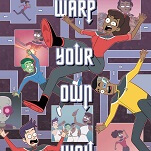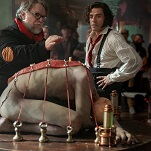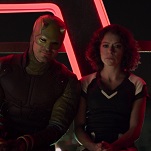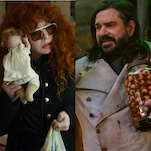“Faith And Despondency” is plagued by many of the problems that have been haunting this season since the start. It’s too long (I realize that this criticism gets repetitive, and I wish to god it wasn’t an issue, but when week after week brings episodes with massive pacing problems that also just happen to run twenty minutes to a half hour longer than the standard running time, it’s hard not to make certain connections), and that longness is full of characters we don’t know much about doing supposedly “shocking” things that don’t mean much at all. I’m giving up on Chibs and Althea’s struggling romance. The scene between the two of them this week takes place in a bedroom and not a parking garage, and at least doesn’t end with the sheriff demanding Chibs fuck her in public; but apart from that, it’s still the same basic beats as before, with Althea getting frustrated and Chibs being resigned, and then they yell at each other a bit, and then the sex happens. This could be meaningful if Althea had an actual character, but she does not. Chibs, at least, has history to draw on. Althea is just some woman who does things for seemingly contradictory reasons. That can make for great drama, but there needs to be some sort of context for those reasons. As is, she’s just an actor dressed up as an argument.
There are more complaints, which shouldn’t surprise anyone who’s read these reviews. The opening montage of characters fucking is just weird; it starts off with the directness that has marked this show at its best (lots of naked people in a very intimate moment, presented without apparent judgement), but ultimately lapses into self-parody by the time we see Juice getting screwed by Tully in jail. Even worse, there are multiple scenes that draw attention to this new “relationship.” I guess it’s darkly comic and awful, which is—look, I don’t even know at this point. Juice’s storyline hasn’t made sense in ages, and this new turn adds nothing and doesn’t matter. Like so much of this season, it plays like a bet made by writers determined to find some new way to catch us off guard. Ha ha, Tully sent Juice a vial of cocaine and a jar of petroleum jelly. Then he reads him poetry. What a world, right?
The thing is, though, “Faith And Despondency” also has at least two really, really good scenes; one of them is so good, in fact, that I’d rank it up there with the show at its peak. Crucially, neither scene exists in a vacuum. This isn’t a one-off appearance from some entertaining guest star. These are sequences that build off of established history of regular characters. In one case, that build leads to something devastating that we’ve been waiting to hear for months now. In the other, it’s an entirely unexpected moment of grace. Both serve as reminders of how great Sons Of Anarchy can be when it has a purpose and a focus to its storytelling. I realize that I often sound harsh in these reviews. Maybe I am harsh. But a large part of that comes from the frustrated knowledge that this show used to be so much better than it is now, and that the elements needed to make something compelling and powerful are still there, provided anyone can find them.
All right, let’s deal with the most obvious scene first: Abel dropping a dime on Gemma to Jax. Ever since the kid overhead his grandma confessing to Tara’s murder, this shoe has been waiting to drop. (And just in case we didn’t realize that Abel was a walking time bomb, the show helpfully arranged to have him eavesdrop on another tearful confession, like it was some bad comedy routine that he and Gemma were going to have to run through until one of them died.) Poor Abel—poor, creepy Abel—has been loaded down with too much stress for a little kid to handle, and he finally explodes by cutting himself with a fork and blaming Gemma for the injury. It’s a clever trick; maybe a little too clever, given that Abel has never come across as a Machiavellian genius in the past, but kids can do impressive things when they’re trying to protect themselves and their siblings. Given the slog this season has been, I’m not sure Abel’s self-harm is as powerfully upsetting an act as it should’ve been, but it makes basic sense, so I’ll give it a miss.
The real value comes later, when Jax, seeing how upset his son is, and realizing all the good work Wendy has done in the past few weeks, decides to come clean to Abel about his birth mother. It’s a sweet exchange whose sweetness is only slightly undercut by the fact that Jax assumes the choice to explain things to Abel is entirely his; Wendy herself comments on this afterwards, although her criticism is undercut by her obvious relief at having the whole thing out in the open. (And really, this is consistent with Jax’s character. He’s not really a “consult with others about major life choices” kind of guy.) Wendy is one of the few trustworthy and reliable figures the show has left, and it’s unexpectedly moving to have Jax finally, officially recognize her as a part of the family.
Unfortunately, Abel really isn’t in a good headspace to process this news, and when Jax goes to tuck him into bed, the kid asks if Gemma killed Tara so Wendy could take her place. We’ll have to wait until next week to find out how seriously Jax takes this revelation (with three episodes left in the season, I’d guess that he’ll pretend like it’s just confused kid talk, but grow more convinced over time), but it’s still a great moment regardless, and part of the greatness comes from just how long we’ve been waiting for this, or something like it, to happen. While this doesn’t redeem the tedium of previous episodes, it at least demonstrates that there’s something to be said for holding a moment back as long as possible.
The other great scene this week—okay, back up a second, I just realized there was also a bit where Unser shot a white supremacist, so let’s say there are at least three good-to-great scenes, and enjoy that for a second. Unser, kicking ass. It was frustrating that SAMCRO didn’t think to call the actual cops when they realized that Leland was coming for the injured officer, but hey, Unser got the job done, and it’s fun to see him get a chance to be part of the violence for once, instead of just staring mournfully at it from the sidelines. Unser rocks, and I’m still half-convinced that, Abel or no, he’s going to be the one that finally figures out what Gemma and Juice did.
But the scene I was going to talk about before I interrupted myself wasn’t a violent one. So far as I can tell, it has almost no bearing on the season’s major storyline at all. Tig and Venu’s relationship started off as a joke. Venus herself was a guest star turn from a familiar face who didn’t seem like someone we’d ever see again. But Walton Goggins’ commitment, and some surprisingly sensitive scripting, found depth and compassion in a character who could’ve all too easily been a sight gag; and her and Tig’s growing connection has been unexpectedly sweet. That sweetness pays off this week, after the two have a night in bed together, and Tig leaves in the morning with certain regrets. There’s a long, lingering shot of Venus watching herself in the mirror, and later that night, when Tig comes back to see her, Venus explains that she doesn’t think this relationship is going to work out; that she can’t be with someone who’s only hooking up with her for some sort of exploitative, temporary thrill, because her feelings for Tig run deeper. She needs him to accept her for who she is, and she doesn’t think he can do that. So Tig tries to explain where he’s coming from, and how much she matters to him, and in the end, he tells her that he wants to try and make this work. Then they embrace.
There’s no over-the-top violence in the sequence, or forced attempts to catch us off guard. It’s just two people with feelings for one another trying to negotiate the challenges and value of those feelings as patiently and gently as they can. There have been plenty of relationship talks on this show, but it’s rare to see something this unforced and intimate. Tig has done some horrible, horrible shit over the years, but Kim Coates has always managed to find some barely redeemable heart at the character’s core. That pays off here. If nothing else, it’s a conversation that treats its participants, and its audience, as actual adults, dealing with complicated, tricky issues, and offering hope that maybe things might be okay in the end. I mean, I’m sure they won’t be, but it’s nice to pretend for a few minutes.
Stray observations:
- I guess Moses is no longer a problem, huh. Jax and the others manage to trick him into going out with his crew to the farm where the White Power guys live, and boy, that is not a creepy sentence to write at all. (I realize this group is trying to underplay its White Power connections, but still.) Anyway, more killing, and Moses suffers the same fate as Bobby.
- Tig shot a guy in the dick for talking smack about Venus.
- Look, I don’t work with kids, but I gotta say: demanding a potentially abused child confess the identity of the accused abuser right in front of that accused abuser doesn’t make a lot of sense to me.
- Speaking of Abel and his injuries, did he have a bandage on his arm in that last scene? I couldn’t tell.
- Oh, and Jax started sleeping with the nice prostitute he met during “Greensleeves.” She says, “You’re a really decent guy, Jax,” so I wonder how long she’ll last.








































